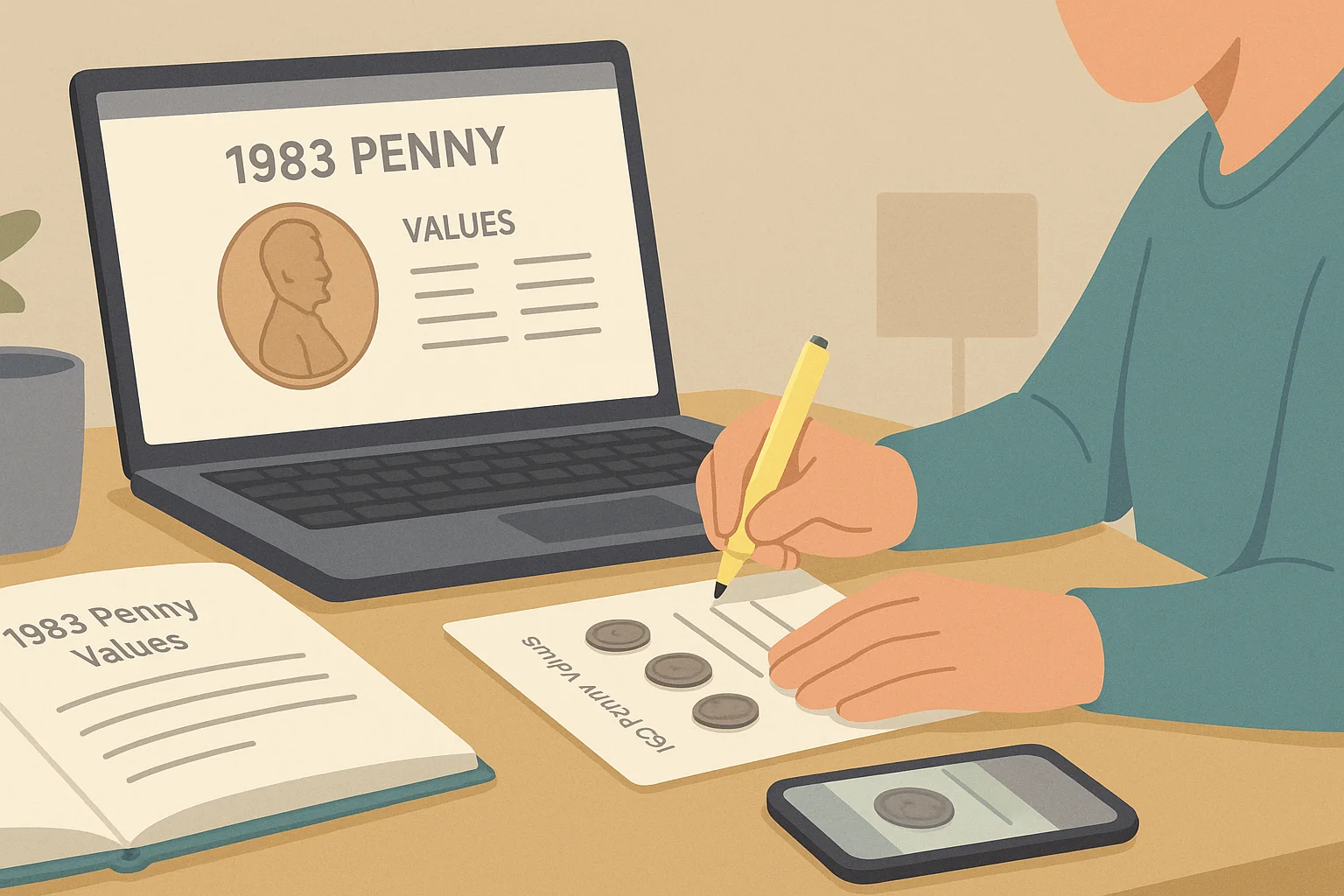1983 Penny Details That Make Its Price Auction-Level
The 1983 Lincoln penny might be worth more than it seems to you. At face value, it's just another piece of pocket change. For collectors, however, it signifies some of the most interesting transitional periods in U.S. Mint production, with a 1983 penny value reaching an auction level.
Is your penny rare? Here are some hints for your research.

Background: The Shift From Copper to Zinc
Before 1982, the standard Lincoln cent was made from an alloy of 95% copper and 5% tin and zinc, giving each coin a weight of roughly 3.11 grams. Rising metal costs created economic pressure, and the Mint adopted a new composition in 1982: a zinc core coated in a thin layer of copper. These 97.5% zinc and 2.5% copper cents weighed 2.5 grams, making them lighter and cheaper to produce.
The change was rapid, but the transition was not perfect. Planchets from the older copper alloy remained in the supply chain of the Mint as 1983 production got underway. This fact is what makes some 1983 pennies quite valuable.
The 1983 Transitional Error Penny
A small number of 1983 pennies were mistakenly produced on leftover solid copper planchets, rather than the new copper-plated zinc ones. These transitional errors are extremely rare, are visually indistinguishable from regular cents, and cannot be distinguished except by weight.
Feature | Standard 1983 Penny | 1983 Transitional Error Penny |
Composition | Copper-plated zinc | 95% copper alloy |
Weight | ~2.5 grams | ~3.11 grams |
Rarity | Common | Extremely rare |
Potential Value | Face value to modest premium | Thousands to tens of thousands at auction |
Collectors view these transitional pieces as key historic markers—coins minted at the convergence of economic necessity, industrial efficiency, and human oversight.
Why 1983 Pennies Can Reach Auction-Level Prices
While most 1983 pennies circulate unnoticed, some of the rare copper transitional pieces, plus certain doubled die varieties, can have very high monetary value and strong auction bidding interest. Not being immediately apparent to the naked eye, these coins invite collectors to carefully examine everyday cents for surprises. This possibility is part of their enduring appeal.
Key Varieties, Grading Factors, and Price Drivers
The value of a 1983 penny ranges widely. Most examples stay common with minimal premium, but with certain traits, their desirability reaches far beyond face value. Being able to recognize these details is essential for identifying pieces that may reach auction-level pricing.
1. Transitional Error Pennies — The Weight Test
The most famous and valuable 1983 pennies are those mistakenly struck on old copper planchets. These coins look identical to ordinary zinc cents at first glance. Their distinguishing feature is weight.
Simple Identification Check
Test | Standard Zinc 1983 Penny | Transitional Copper 1983 Penny |
Expected Weight | ~2.5 grams | ~3.11 grams |
Sound (when tapped) | Flat, softer ring | Sharper, higher ring |
Rarity | High circulation, very common | Extremely scarce |
Market Value | Minimal premium | $5,000 to $25,000+ in high grade |
Because of their rarity, confirmation is necessary before assigning value. Any suspected transitional coin should be verified through accurate weighing and later through professional authentication.
2. Doubled Die Varieties — Detail in the Design
1983 also produced several doubled die reverse (DDR) and doubled die obverse (DDO) varieties. These variations occur when the coin’s die shifts during hubbing, creating doubled lettering or design lines.
Common signs include:
Strong doubling on ONE CENT lettering
Doubling in UNITED STATES OF AMERICA
Minor doubling of Jefferson Memorial (less common but documented)
High-grade DDR coins have reached more than $7,000 at auction. Mid-grade examples may still command hundreds or more.
3. Mint Mark and Color Grade Matter
The 1983 penny exists in two primary mint types:
Philadelphia (no mint mark)
Denver (D)
Both can show valuable varieties, but Denver examples often display clearer doubling and stronger strike qualities in certain coins.
Color also influences value:
RD (Red): retained original copper color
RB (Red-Brown): partial toning
BN (Brown): fully toned
A coin graded MS65 RD will command a significantly higher premium than the same coin in toned or worn condition.
4. Auction Results Show the Upper Range
Some recorded sales include:
1983 Copper Transitional Penny MS62 — around $10,000
1983 DDR MS65 RD — over $6,000
1983-D DDR high-grade — $400 to several thousand depending on certification
These figures are realistic benchmarks backed by public sales. They show how small details can transform a coin’s financial profile.

How to Evaluate, Verify, and Manage Your 1983 Pennies
With strong price potential comes the need for careful evaluation. Many 1983 pennies will be ordinary, but the possibility of finding a transitional or doubled die variety makes structured inspection worthwhile. The key is to move step-by-step, ensuring that no detail is overlooked.
Step 1 — Weigh the Coin Accurately
Because the transitional copper penny is defined by weight, this is the most direct test.
Use a digital scale that measures to at least 0.01 grams.
If the coin weighs:
Around 2.5 g — it is a standard zinc coin.
Around 3.11 g — further verification is recommended, as it may be a transitional copper planchet.
Do not try to determine composition by sound alone. Use the scale first.
Step 2 — Check for Doubling or Strike Variations
Use a magnifying loupe (6x–10x) to examine:
ONE CENT
UNITED STATES OF AMERICA
Mint mark area
The shape of Lincoln’s profile edges
True doubled dies show split or shadowed lines that appear part of the design, not scratches or post-mint damage.
Step 3 — Avoid Cleaning the Coin
Cleaning removes original surface texture and destroys collector appeal. Even minor cleaning dramatically lowers value. Handle the coin by its edges only, preferably while wearing soft gloves.
Step 4 — Use Reference Sources and Digital Tools
Price guides and auction archives are invaluable, but organizing your findings is equally important.
The Coin ID Scanner app helps streamline the process by allowing you to:
Photograph the penny and identify its type, year, and composition
View standard weight and diameter specifications
Compare your coin against known varieties
Store notes and track condition over time
Manage your collection digitally, making it easier to revisit coins for re-evaluation later
Its database of 187,000+ coins supports both beginners and experienced collectors in recognizing important characteristics early.
Step 5 — Consider Professional Certification
If you suspect a transitional metal composition, high-grade doubled die, or exceptional surface preservation, professional grading from PCGS or NGC strengthens market credibility. Certified coins regularly achieve the highest auction results.
The 1983 penny stands as one of the most compelling modern coins due to its transitional manufacturing history and variety potential. A single detail such as weight, doubling, or preserved color can elevate a seemingly ordinary cent into a premium collectible.
With clear evaluation steps and digital support from tools like the Coin ID Scanner app, collectors can identify valuable examples with confidence and build a focused, informed approach to searching for these hidden rarities.
Recent post
-
Top Destinations for Cheap Travel in 2023 Explore the most affordable travel destinations for 2023 with VoyageVista. Discover budget-friendly tips and hidden gems in Laos, Thailand, India, Mexico, Costa Rica, the Baltic States, Romania, Moroc...
-
Is Turkey Safe to Travel? Dive into our in-depth guide on the safety of traveling to Turkey. Discover how Turkey ensures a safe and enjoyable experience for tourists, from bustling Istanbul to tranquil Cappadocia. Learn about ...
-
The Ultimate Packing List: Must-Have Items For Every Traveler Discover the ultimate packing list with must-have items for every traveler. Get expert tips on packing efficiently, whether you're heading outdoors, on a business trip, or a long-term adventure. Enhan...
-
Traveling Solo? Here’s How Location Tracking Apps Keep You Safe Explore the benefits of location tracking apps for solo travelers. Learn how real-time sharing, SOS features, and geofencing can ensure your safety and enhance your travel experience. Stay safe and tr...
-
Learn About American Women Quarters Program: Numismatists’ Overview Discover the American Women Quarters Program (2022–2025), honoring trailblazing women in U.S. history. Learn coin designs, collecting tips, preservation methods, and how the Coin ID Scanner app help...





